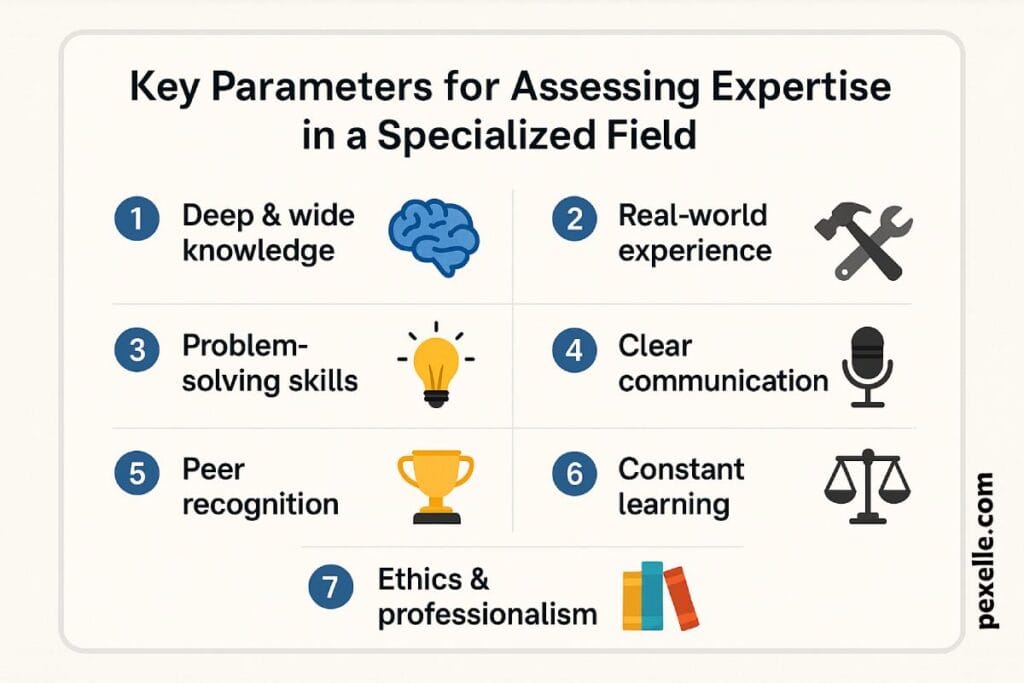Key Parameters for Assessing Expertise in a Specialized Field

In today’s rapidly evolving knowledge economy, assessing a person’s true expertise in a specialized field is both a strategic necessity and a challenging task. Whether in science, technology, medicine, finance, or the creative industries, employers, academic institutions, and clients all seek reliable indicators to evaluate competence. But what exactly defines expertise, and how can we measure it comprehensively and fairly?
This article outlines the key parameters that should be considered when evaluating a person’s skill level and domain-specific mastery. These parameters can be used in professional hiring, educational evaluations, mentorship, or performance reviews.
1. Knowledge Depth and Breadth 📚
At the core of any expertise lies domain knowledge. This includes both:
- Depth: A thorough understanding of complex concepts, principles, and techniques within the field.
- Breadth: Awareness of adjacent disciplines and the ability to interlink ideas across related domains.
Assessment methods:
- Written or oral examinations
- Portfolio or project reviews
- Peer interviews and technical discussions
2. Practical Experience 🛠️
Hands-on experience is often the strongest indicator of proficiency. Practical exposure enables professionals to:
- Solve real-world problems
- Work under constraints and deadlines
- Develop process-oriented thinking
Experience can be measured by:
- Number and quality of completed projects
- Years of active involvement in the field
- Diversity of tasks undertaken (e.g., fieldwork, management, research)
3. Problem-Solving and Critical Thinking 🧠
Expertise is not just about knowing facts—it’s about applying them intelligently. A true expert demonstrates:
- Analytical thinking
- Decision-making under uncertainty
- Innovation and adaptability
Tools to assess this include:
- Case studies or situational challenges
- Simulated environments
- Code challenges or design sprints (for technical roles)
4. Communication Skills and Knowledge Transfer 🗣️
An expert who cannot explain or transfer their knowledge may have limited impact. Effective communicators can:
- Teach or mentor others
- Write reports, documentation, or papers
- Present complex ideas clearly to various audiences
Evaluation can be done via:
- Presentation reviews
- Teaching or training sessions
- Publication history or public speaking engagements
5. Recognition and Peer Validation 🏆
Recognition by others in the field is a strong signal of expertise. This can take various forms:
- Peer-reviewed publications
- Conference invitations
- Awards or certifications
- Referrals and testimonials
These are indirect but valuable indicators of credibility.
6. Continuous Learning and Growth Potential 📈
Experts stay relevant by constantly evolving. A high-level specialist often:
- Engages in lifelong learning
- Adapts to emerging trends and technologies
- Contributes to thought leadership
Assessment of growth potential can be done through:
- Training history and certifications
- Attendance at seminars, workshops, or webinars
- Evidence of self-driven learning (e.g., GitHub activity, research)
7. Ethical Judgment and Professionalism ⚖️
Technical expertise without ethical integrity can be harmful. True professionals:
- Follow industry standards and codes of conduct
- Respect intellectual property and data privacy
- Maintain accountability and transparency
Behavioral interviews, reputation checks, and ethical scenarios can help assess this crucial dimension.
Conclusion
Evaluating a person’s skill level in a specialized field is a multi-dimensional task. It demands a balance between subjective insights and objective data. While certifications and years of experience provide surface-level evidence, deeper indicators like problem-solving ability, peer recognition, ethical standards, and communication skills paint a more accurate picture.
By applying a holistic evaluation framework based on these parameters, organizations and institutions can identify and nurture genuine experts—those who not only excel in their domain but also contribute meaningfully to its growth and development.
Source : Medium.com




